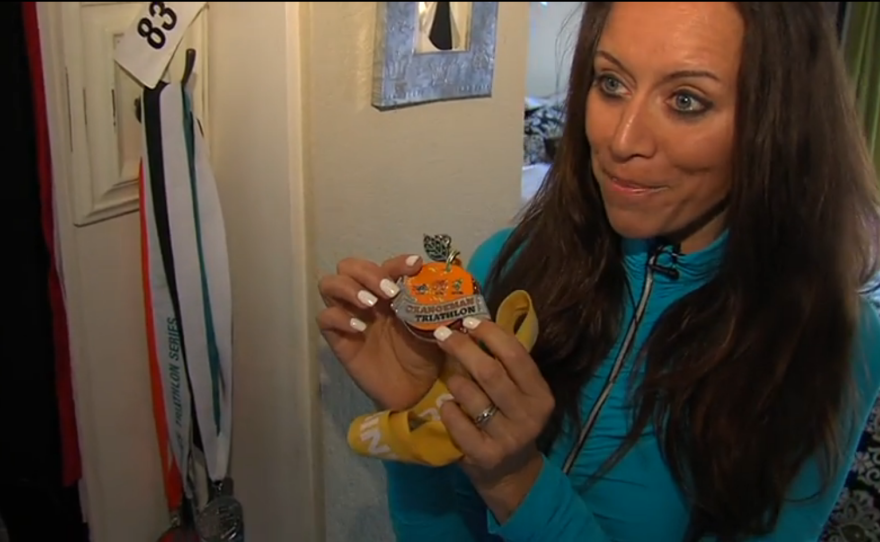About 350,000 Americans have multiple sclerosis. The degenerative disease can cause muscle weakness, problems with coordination and eventually rob patients of their ability to walk and talk.
However, some patients refuse to let the condition get the better of them.
Aurora Colello loves to show off the medals she’s won from various triathlons.
"Probably the one I’m most proud of is the Orangeman Half Ironman: 1.2 mile swim in the ocean, 56 mile bike, and then a half marathon, 13.1 miles," the short brunette said as she held one of her medals. "I trained for about nine months for this race. I just wanted to get to the finish line, alive and with a smile on my face. And I got fifth place for my age group."
The amazing thing is that Colello, who’s 40, didn’t exercise at all until 2008. That’s when she got a diagnosis that scared her.
Here’s what happened: Colello started having pain and blurry vision in her right eye.
Suddenly one morning, things went totally haywire.
"I had completely lost my vision, I was completely blind in my right eye," Colello recalled. "So, they rushed me for an MRI. And the MRI showed 10 large lesions all over my brain."
The doctor told Colello she had multiple sclerosis. He said she would start to suffer fatigue, and that her body would slowly fall apart.
The doctor advised Colello to start taking some medications right away to manage the disease.
For days, Colello was devastated. She couldn’t stop crying. Then her husband told her something she’ll never forget.
“'You can’t give in, because if you give in, you will end up in a wheelchair, you will end up will all this stuff your doctors are telling you you’re going to get,'" Colello's husband said. "And when he said that to me, it really hit me, ‘cause I wasn’t fighting it. I was just totally depressed and I felt hopeless, and I don’t think there’s anything worse than that.”
Multiple sclerosis can be crippling, but the director of UC San Diego’s MS Center, neurologist Jody Corey-Bloom, said the disease doesn’t always follow the same course.
"I mean, I would say it’s the unpredictability of MS that makes it the most challenging, and I think very difficult for the patients to have to live with it," the neurologist explained.
Corey-Bloom said there are a number of medications, both injectable and in pill form, that work quite well in helping to manage MS symptoms.
"These therapies are actually amazing, in the sense that they can really, in many instances, keep patients where they are," she said. "They can give them their best shot at not progressing, really. The problem is that some people don’t start them until too late."
Colello decided early on she didn’t want to take standard medications at all. That’s because some MS patients she talked to said despite taking the drugs, they kept getting worse. And she was worried about side effects from the treatments.
So Colello chose to battle MS by adopting a rigorous exercise program: 15 hours a week of riding a bike, running and swimming. She went on a strict diet, too, and started taking a lot of supplements. She went to see a neurologist, Klureet Chaudhary, who offers MS patients a different path at her clinic, Wellspring Health.
"The first thing I look at is 'What are you eating that’s contributing to that?' And then the other things we look at are 'What are you doing to help fight that? How’s your stress level? What type of exercise program are you involved in?'" Chaudhary said.
Chaudary is an MD who specializes in ayurvedic medicine, an ancient Indian discipline that attempts to restore health by cleansing the body of substances that can make people sick.
Chaudary believes making lifestyle changes is a crucial part of healing.
"If you can take people who are diabetic and improve their lifestyle, and they’re no longer diabetic, why can’t we do that with MS?” she asked.
Colello said that approach is working for her. In fact, she’s stepping up her training to prepare for a triathlon in Malibu this September.
When she was first diagnosed, Colello woke up every day and wondered if her MS would get worse.
"I don’t wake up and think that anymore," she said. "When I wake up, I think to myself, 'When am I going to get my hour swim in today? When am I going to go on my two-hour bike? Am I taking my kids to the beach to surf today, or are we going to go to the park?' That’s how I live my life."






